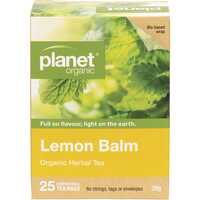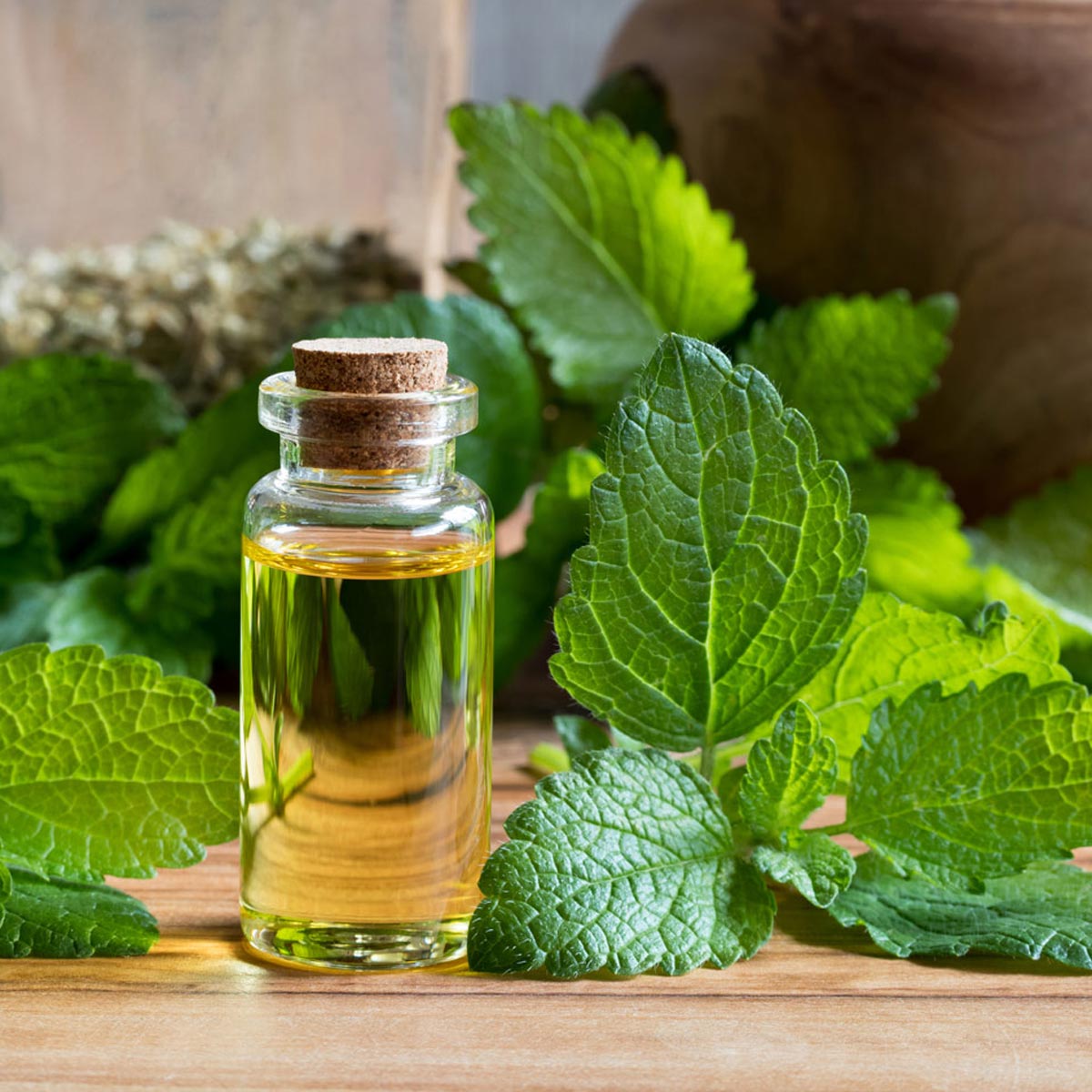Lemon balm is a popular herb used in tea, extracted as oil, and added to food to enhance flavour. Also known as Melissa officinalis, this much-loved plant combines a lovely lemon scent with numerous health benefits. Lemon balm has been consumed for centuries in traditional medicine, and it's still used today to promote physical health and mental wellness. The delicate aroma and flavour of this perennial plant is supported by numerous nutritional and medicinal benefits, which range from pain relief and digestive support to anxiety and insomnia treatment.
Let's take a look at lemon balm, review its history and application, and analyse some of the medicinal benefits attributed to this popular aromatic herb.
Introducing Lemon Balm
Lemon balm is a member of the mint family that's native to south-central and Mediterranean Europe, Iran, and Central Asia. Along with its native territory, this popular plant has been naturalised all over the world. Hungary, Egypt, and Italy are the major producers of lemon balm, although it grows vigorously in many other countries. Lemon balm is known to attract bees, and it's also known as bee balm, bee’s leaf, or honey plant.
Lemon balm is a relatively small plant that grows to a height of 1 metre, with its heart-shaped leaves measuring 2-8 centimetres with a rough veined surface. Melissa officinalis plants live for a decade, with commercial crops generally replaced every five years to help rejuvenate the soil. Lemon balm is sold as an ornamental plant, used for flavouring in numerous foods, and sold in various combinations and consistencies as a health product.
From pure essential oil to dried tea leaves and commercial products, lemon balm is a versatile plant that's highly regarded and much-loved. The essential oil from this plant is used as a perfume in toothpaste products, and the flavour is isolated and added to ice cream and herbal tea. The dried and fresh leaves of this plant can be added to a variety of dishes, including fish, pesto, and gherkins. Lemon balm is also the primary ingredient of carmelite water, which is a popular herbal tonic sold in German pharmacies.
History of Lemon Balm
Lemon balm has a long history of use as a herbal medicine, with this plant consumed across the world for hundreds of years. In fact, the second scientific name of this plant, officinalis, originates from the apothecaries. These medical professionals sold lemon balm and other herbal remedies directly to patients, in a way very similar to modern pharmacies. This plant originated in the Middle East and North Africa, before migrating to southern Europe in the 1500s and America by 1700.
Lemon balm had a strong cultural significance for the ancient Greeks, and it was also used by the ancient Arabs as a tonic for the body and mind. The ancient Greeks believed a special relationship existed between lemon balm and bees. They thought bees would never abandon a hive when the herb grew nearby, and they would even rub hives with lemon balm to make bees feel welcome.
Lemon balm was said to promote long life, and it was also taken as a strewing herb to "transmit messages between lovers." The mystical soothing and mental health powers of this plant were also noticed by the Arabs, who thought it caused the "mind and heart to become merry." This early influence introduced lemon balm as a potential treatment for anxiety and depression, which are two of its more popular uses today.
Over the centuries, lemon balm has been used to treat a wide range of physical and mental complaints. It has been taken to treat dog and scorpion bites, added to wine to help soothe patients, and consumed to treat heart disorders. In the middle ages, this plant was taken to heal wounds, relieve ear and toothache, manage pregnancy sickness, and even prevent baldness. While many of these applications have little basis in fact, lemon balm is rightly associated with a range of useful astringent, digestive, antiviral, hypnotic, sedative, and cognitive boosting effects.
How to Consume or Apply Lemon Balm
Lemon balm is available in many forms, from fresh and dried leaves to commercial formulations, extracts, and essential oils. The following list represents the most popular forms:
- Lemon balm tea – The delicious fragrance and taste of lemon balm makes it a favourite among herbal tea lovers. Lemon balm tea has a brisk, tart, and refreshing citrus flavour with hints of mint.
- Essential oil – This essential oil is a clear to yellow liquid with a watery viscosity and citrus-like aroma. This essential oil is applied topically and suitable for cosmetic skincare purposes. • Beauty products – Lemon balm is often added to beauty products, with its lemon scent and skin-clarifying properties ideal for creams, cleansers, and hair products.
- Culinary herb – This popular herb is often added to savoury dishes to enhance the flavour and aroma. Lemon balm is very popular on fish and seafood dishes and is often added to pesto.
The Many Benefits of Lemon Balm
Lemon balm is loved the world over for its delicious taste and useful medicinal qualities. Easy to consume in tea and widely available as an essential oil, this herb offers the following health benefits.
Promotes digestive health
Lemon balm may have a positive effect on digestion, making it a great tool for people who experience abdominal pain and discomfort. According to a study from 2010, some herbs can have favourable effects on digestion, including Melissa officinalis. Lemon balm was found to reduce the symptoms of functional dyspepsia, which is a clinical condition of discomfort or pain experienced by a large segment of the healthy population. Based on a historical overview of lemon balm, this herb has been used to treat bloating, colic, stomach acid, and nausea.
Reduces stress and promotes rest
Lemon balm has traditionally been taken as a relaxant, with its sedative properties helping to promote rest, induce sleep, and reduce stress. According to one study, foods containing lemon balm had a positive effect on mood and stress levels, with numerous positive behavioural effects noted in an applied health setting. According to another study, a combination of lemon balm and valerian can be effective in the treatment of restlessness and dyssomnia. This study involved children younger than 12 who were experiencing restlessness problems, with the vast majority of participants experiencing an improvement.
Helps to reduce anxiety and depression
The hypnotic and sedative qualities of lemon balm have been linked with positive mental health outcomes. Anxiety and depression are serious health issues that affect millions of people around the world, with herbal remedies effective for some people. Lemon balm may help to reduce some of the symptoms of anxiety, including nervousness and excitability.
In a study into anxiety disorders and sleep disturbances, lemon balm was found to be a viable option for people with mild-to-moderate disorders. Lemon balm also inhibits thyroid functioning, combating hyperthyroidism and functioning as a mood enhancer for people with depression. While further studies are needed, the use of lemon balm and other herbal remedies may help people to avoid potentially harmful drugs such as benzodiazepines and antidepressants.
Supports cognitive function
Melissa officinalis has been found to support cognitive function in healthy adults. In one study, participants were asked to perform cognitive tasks involving memory, mathematics, and concentration. Participants who ingested lemon balm performed better than those who didn’t, with an increase in alertness and performance noted. Combining lemon balm with food was found to have a positive effect on the absorption rate and efficacy of the herb, although once again, additional research is needed to get a comprehensive picture. Due to its cholinergic receptor binding properties, some lemon balm breeding lines may support positive cognitive effects linked with increased alertness and memory.
Offers mild pain relief
Lemon balm has anti-inflammatory properties, and it may be useful in treating pain from toothache and headache. Due to its hypnotic, sedative, and relaxing qualities, it can help people to release physical tension and reduce muscle-based stress. According to a detailed overview into Melissa officinalis, lemon balm products may help to treat migraine, headaches, toothaches, earache, nerve pains, and stiff necks, among other inflammatory conditions. Based on this overview, consuming lemon balm may help to reduce pain by opening up and relaxing tight blood vessels.
Lemon balm is a delicious, nutritious, and beneficial natural herb that has been used by humans for hundreds of years. If you want to enjoy the full benefits of this amazing plant, lemon balm is widely available in tea form or as an essential oil. Drinking lemon balm tea is an effective way to ingest this plant, with essential oils and beauty products fantastic for topical applications. If you want to experience the benefits of lemon balm for yourself, please check out the great range at Healthy Being today.


 Certified Organic
Certified Organic Vegan Friendly
Vegan Friendly  Vegetarian
Vegetarian Organic Ingredients
Organic Ingredients Dairy Free
Dairy Free Gluten Free
Gluten Free Keto Friendly
Keto Friendly






























